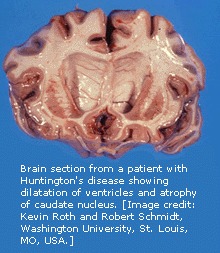NCBI Bookshelf. A service of the National Library of Medicine, National Institutes of Health.
National Center for Biotechnology Information (US). Genes and Disease [Internet]. Bethesda (MD): National Center for Biotechnology Information (US); 1998-.

Huntington disease (HD) is an inherited, degenerative neurological disease that leads to dementia. About 30,000 Americans have HD and about 150,000 more are at risk of inheriting the disease from a parent.
The HD gene, whose mutation results in Huntington disease, was mapped to chromosome 4 in 1983 and cloned in 1993. The mutation is a characteristic expansion of a nucleotide triplet repeat in the DNA that codes for the protein huntingtin. As the number of repeated triplets - CAG (cytosine, adenine, guanine) - increases, the age of onset in the patient decreases. Furthermore, because the unstable trinucleotide repeat can lengthen when passed from parent to child, the age of onset can decrease from one generation to the next. Since people who have those repeats always suffer from Huntington disease, it suggests that the mutation causes a gain-of-function, in which the mRNA or protein takes on a new property or is expressed inappropriately.
With the discovery of the HD gene, a new predictive test was developed that allows those at risk to find out whether or not they will develop the disease. Animal models have also been developed, and we know that mice have a gene that is similar to the human HD gene. Research on understanding the mechanism that causes the triplet repeat to increase is ongoing, since its discovery could be critical to the development of an effective treatment for this and other similar diseases.
Related diseases
- Genome view see gene locations
- Entrez Gene collection of gene-related information
- BLink related sequences in different organisms
- Research articles online full text
- Books online books section
- OMIM catalog of human genes and disorders
- GeneReviews a medical genetics resource
- Huntington Disease Society of America information for patients and the public
- GeneLocus Links
- Huntington disease - Genes and DiseaseHuntington disease - Genes and Disease
Your browsing activity is empty.
Activity recording is turned off.
See more...
